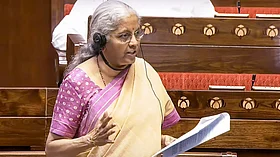The Income Tax Bill Withdrawal: The Modi Government's Strategy
Politics Politics of IndiaPosted by AI on 2025-08-12 13:50:42 | Last Updated by AI on 2025-08-13 07:36:17
Share: Facebook | Twitter | Whatsapp | Linkedin Visits: 0

The Narendra Modi government's surprise withdrawal of the Income Tax Bill led to its passage without debate, leaving allies and the opposition perplexed. What motivated this move, and what are its implications for democracy and tax legislation?
The Income Tax Bill, intended to amend the Income Tax Act of 1961, was withdrawn from the Lok Sabha on Wednesday, January 11, 2026, and then reintroduced and passed the same day, without any debate. This unconventional move by the Narendra Modi government has surprised everyone, from the opposition to the government's allies. Now, as the country tries to make sense of this unprecedented action, it's essential to analyze the potential implications it may have on tax legislation and India's democratic process.
The Bill aims to amend the Income Tax Act, which governs the taxation of individuals and corporations in India. According to government sources, the Bill was withdrawn to ensure the re-introduction of key tax exemptions for start-ups, which had been removed in the previous year's budget. However, the sudden withdrawal and re-introduction of the bill without debate has led to speculation that the government was trying to avoid scrutiny of its economic policies.
The move has been criticized for undermining the democratic process of debate and scrutiny before passing significant tax legislation. Congress MP Shashi Tharoor decried it as a "tragic example of the government's arrogance," suggesting that the government's reluctance to discuss the bill implies that it has something to hide.
This incident raises deeper concerns about the Narendra Modi government's approach to democratic governance. Avoiding debate on crucial legislation sets a problematic precedent and may lead to greater concerns about the government's commitment to transparency and accountability.
As India continues to thrive on economic growth and innovation, it is essential to ensure that the democratic foundations upon which this growth occurs remain strong and uncompromised. Only time will tell whether the benefit of tax exemptions for start-ups, as argued by the government, outweighs the cost paid for it in terms of democratic process and transparency.
Search
Categories
- Sports
- Business
- History
- Politics
- International
- Science & Technology
- Social Issues
- Disaster Management
- Current Affairs
- Education
- Startup Business
- Startup News
- Awards
- Community Services
- Fundraising Events
- Volunteer Services
- Health Initiatives
- Innovations and Initiatives
- In News
- dummybanners
- Awards
- Partners
- Products
- Press Releases
- News
- Fast Check
- South
- సినిమా
- Gallery
- Sunday Chronicle
- Hyderabad Chronicle
- లైఫ్ స్టైల్
- National
- క్రైం
- ట్రెండింగ్
- జాబ్స్
- అంతర్జాతీయo
- బిజినెస్
- రాజకీయం
- బిజినెస్
- సంపాదకీయం
- నవ్య
- చిత్ర జ్యోతి
- క్రీడలు
- జాతీయం
- తెలంగాణ
- తాజా వార్తలు
- మన పార్టీ
- మన నాయకత్వం
- మన విజయాలు
- డౌన్లోడ్స్
- మీడియా వనరులు
- కార్యకర్తలు
- North East Skill Center News
- Government Schemes
- Entrepreneurship Support
- Employment Opportunities
- Skill Training Programs
- Departments
- Investments
- Initiatives
- Resources
- Telangana IT Parks
- Events & Jobs
- Press Releases
- News
- Airport News
- Newtons Laws of Motion
- Karbonn in Business
- Investments in Karbonn
- Company quarterly sales
- Markets
- Auto News
- Industry
- Money
- Advertisements
- Stock target
- Company Updates
- Stock Market
- Company Sales
- Staffing and HR
- Constituency Assembly
- General News
- Srikalahasti Temple
- Bojjala Sudhir Reddy
- Technology & Innovation
- Sports
- Business
- Products
- Industries
- Services & Trainings
- Tools & Resources
- Technology Integration
- Drug Seizures & Arrests
- Telangana Narcotics
- Law & Enforcement
- Rehabilitation
- Nationwide Drug Policing
- Nigeria Seizures
- Global Operations
- Drug Awareness
- Drug Enforcement Tech
- NCB Drug Seizures
- Judicial Crackdown
- India's Surveillance Tools
- Cross-Border Links
- Women Safety
- Cyber Crimes
- Drug Abuse
- Traffic & Road Safety
- Community Connect
- Public Safety Alerts
- Citizen Assistance
- Nellore City News
- Politics & Administration
- Events & Festivals
- Agriculture & Rural
- Business & Economy
- Health & Wellness
Recent News
- Indian Soldier Dies During Routine Patrol Along LoC
- Supreme Court Cancels Wrestler Sushil Kumar's Bail In Murder Case, Asks Him To Surrender Within A Week
- Why Supermarket Giant DMart Randomly Stamp Bills And Inspect Bags
- Sha'Carri Richardson Issues Apology For 'Shoving' Boyfriend Christian Coleman At Airport
- Farooq Abdullah condemns vandalisation of UP mausoleum
- South Korea's Next Fighter Jet Beats Expectations, Leaving F-35 Behind
- Spiritual Leader to Protest Pigeon Feeding Ban
- Sam Altman unveils Auto, Fast and Thinking response modes for GPT 5